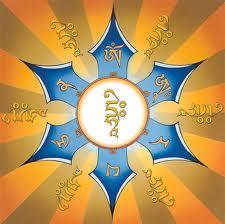
The Bodhisattva Manjushri and his mantra

Manjushri is a Bodhisattva who represents wisdom. With Avalokiteshvara and Vajrapani, he is one of a trinity of family protectors. The family that Manjushri protects is known as Tathagata, and includes the historical Buddha, Shakyamuni, (with whom, of all the Bodhisattvas, Manjushri has perhaps the closest association) as well as Vairochana, the central figure in the Five Buddha Mandala.
"Tathagata," the name of Manjushri’s family, means "The one thus gone [to Nirvana]" or (because of the ambiguities in Sanskrit) "The one thus come [to this world]" and is an epithet of the historical Buddha.
Manjushri is depicted as a beautiful young prince, usually said to be sixteen years old. His freshness and beauty represent the fresh way that the awakened mind sees the world. While the unlightened mind typically sees life as being ordinary, to those who are awakened life is magic, extraordinary, and full of potential. The name Manjushri means "Gently Auspicious One." He is also known as Manjughosha, or "Gentle Voiced One”.Like most Bodhisattva figures, he is seated on a lotus flower. Because the lotus grows from mud in often foul water, and yet remains unstained, it is considered to represent the purity of wisdom, which can exist in the midst of delusion without being affected by it.
Manjushri’s most distinctive emblem is the flaming sword that he holds aloft in his right hand. The sword symbolizes his mind’s ability to cut through the fetters that bind beings to the cycle of delusion and suffering.The flames suggest that the sword is not a literal one, and flames in Buddhist iconography invariably represent transformation; Manjughosa’s wisdom does not destroy ignorance in the conventional sense, but transforms it into Wisdom. In Manjushri’s left hand is his other characteristic emblem: the stem of a lotus, which bears a book. This book is the Perfection of Wisdom, which is both the source of his realization and a concrete symbol of it. In the Manjughosa form the book is held to the heart.
There are numerous other variations of Manjushri, some of which go by different names. For example he is sometimes seen riding a lion, or holding a bow and arrow.
Manjushri features prominently in many Perfection of Wisdom texts. He makes a late appearance in the Lotus Sutra, and is particularly prominent in the Vimalakirti Nirdesa. Both of these are early Mahayana sutras. However he is most often found in the later Perfection of Wisdom Sutras, where he is, in effect, the Buddha’s spokesman. In some of these sutras, the dialogues that Manjushri has with the Buddha are so intimate that we can get a sense that we are hearing the Buddha thinking out loud.
Manjushri is associated with ordinary intelligence and mental acuity as well as transcendent Wisdom, and his mantra Om A Ra Pa Ca Na Dhihis said to confer intelligence. Shantideva, the author of the great Bodhicaryavatara is said to have gained his wisdom by communing with Manjushri by night, while appearing by day as a slovenly and lazy scholar-monk.
Some scholars believe that Manjushri has his origins in a Ghandharva (celestial musician) called Pancashikha, who is found in some early Pali texts. Pancashikha means five-crests, and has a correspondence with Manjushri’s epithet, Pancaciraka,"Possessing Five [Hair]-Braids”. Being a musician, Pancashikha is also "gentle voiced" and is praised by the Buddha for the quality of his singing. Both figures are also involved in question-and-answer sessions with the Buddha, and both are generally depicted as eternally young, although this is so common a quality that it’s not in itself persuasive.
Manjushri is often known as Kumarabhuta ("Youthful Being"), although he does also manifest in some texts as an elderly man. His quality of having eternal youth (sometimes despite appearances to the contrary) symbolizes the eternal freshness and spontaneity with which the enlightened mind approaches life.


